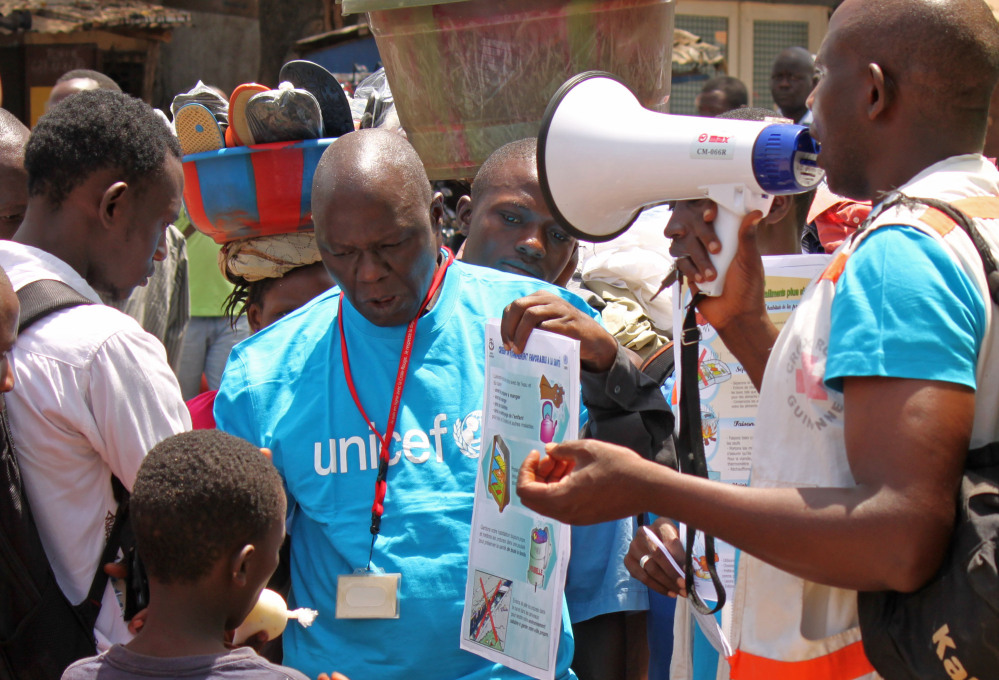CONAKRY, Guinea — Bakari Soumaoro carried his sick friend all the way to the hospital on his back, not realizing that the man’s fever and chills were caused by one of the deadliest diseases on Earth.
A week after his friend died, Soumaoro himself fell ill.
Hospital officials soon determined that both men had contracted Ebola, a disease causing severe bleeding that had never before struck this corner of West Africa. The outbreak has killed more than 86 people in Guinea and Liberia, and it’s not over.
Soumaoro, a driver for an aid group, Plan International, died soon after symptoms appeared. Before long, everyone who had visited him at the hospital was placed into an isolation ward set up by health workers here.
“Fortunately after the waiting period we all tested negative, thanks be to God,” said Mamady Drame, the local director for Plan International in Macenta, 715 kilometers (445 miles) southeast of the capital, Conakry.
Ebola is so virulent that those who do test positive can only wait to die in a special ward where they are treated by medical personnel wearing protective suits and gear. The Zaire strain detected in Guinea kills up to 90 percent of its victims, and with no cure all that can be done is to make patients comfortable as their organs begin failing.
The West African nation of Guinea is among the poorest in the world, and is severely lacking in health care facilities outside Conakry. Those who have been exposed to Ebola in southern Guinea are kept in one ward. If it’s confirmed they do have Ebola, they then are moved to the second pavilion to await death.
Three more suspected cases were put into quarantine on Wednesday in Macenta, where already 14 people have died.
It’s a similar situation in neighboring Liberia, where health officials say the deaths of two sisters have been confirmed as Ebola. One of the women left behind a baby and a husband who are now in isolation.
The cases have been dramatic: One man dropped dead only 30 minutes after he arrived at a hospital in Liberia. Another person was taken not to a clinic, but to a church for a prayer of divine intervention. She died on Wednesday.
Amid Ebola’s near-certain death sentence, fear and panic have spread. Passengers fled a bus after an elderly man vomited on board. In neighboring Liberia, one market emptied out when people falsely believed they could catch the disease simply from breathing the same air as victims. In Liberia’s capital, Monrovia, cashiers at one grocery store wore rubber gloves to protect themselves.
In southern Guinea, church pews are now empty on Sundays. People are fearful of shaking hands and instead make the sign of the cross when they greet a friend or loved one.
“Here it’s like time has stopped. Every day is potentially dangerous for us. And it’s only God who can save us from this disease,” said Lalla Balde, who lives in Macenta.
Send questions/comments to the editors.



Success. Please wait for the page to reload. If the page does not reload within 5 seconds, please refresh the page.
Enter your email and password to access comments.
Hi, to comment on stories you must . This profile is in addition to your subscription and website login.
Already have a commenting profile? .
Invalid username/password.
Please check your email to confirm and complete your registration.
Only subscribers are eligible to post comments. Please subscribe or login first for digital access. Here’s why.
Use the form below to reset your password. When you've submitted your account email, we will send an email with a reset code.